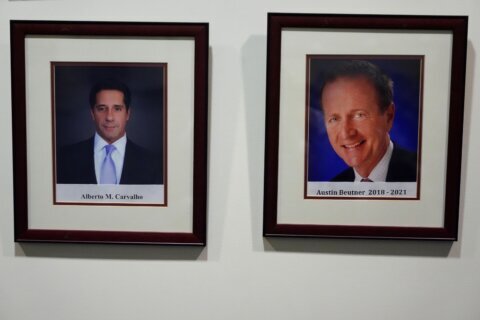
As students on college campuses across the county protest Israel’s actions in Gaza, they have increasingly called on their institutions to divest from Israel.
Chris Marsicano, an assistant professor of educational studies and public policy and the director of the College Crisis Initiative at Davidson College, says there are three ways in which universities could have ties to Israel — and severing some of those economic connections would be simpler than others.
There are three common demands made by student groups, Marsicano said.
The first is divesting from weapons manufacturers; the second is divesting from Israeli businesses; and the third is divesting from businesses that do business with Israeli businesses.
Marsicano says of the three, “that last one is the hardest.”
For example, cutting off ties to weapons manufacturers is relatively simple, with some alternatives for colleges and universities.
“There are index funds, or ETFs or different kinds of funds that have already been created that exclude weapons manufacturers,” he said. “That is not terribly difficult.”
Marsicano also told WTOP that divesting from Israeli-based businesses — while it could be costly — is possible and fairly clear-cut.
But trying to sift through investments with companies like Google, Amazon and PepsiCo that may themselves have ties to Israel is much more complex, Marsicano said.
“It becomes very, very, very difficult to do because it’s near impossible to know all of the companies that have any business with businesses that are based in Israel,” he said.
Marsicano compares that process to hiring a contractor to remodel a kitchen. That contractor will likely hire a subcontractor, who may in turn, hire someone to perform one task for a given day.
“You know who your contractor is. You may even know who your subcontractor is,” Marsicano said. “But you don’t necessarily know the name of the guy putting the tile in your kitchen. That’s what students are asking for,” said Marsicano. “That level of granularity is really difficult to get to.”
Another issue, Marsicano said, is the level at which larger universities are reliant on their endowments.
“What’s not being talked about enough,” said Marsicano, is the level at which those endowments may fund scholarship and aid packages for low-income students.
The University of Southern California, for example, “has an extraordinarily large number of very low-income students,” and he said endowments help pay for their education. “So those students don’t have to pay tuition.”
Marsicano also said that the investment picture varies quite a bit from school to school, especially when comparing schools like Columbia or Georgetown University to smaller campuses.
“The vast majority of colleges and universities — and certainly community colleges and technical schools — are not invested the way that Georgetown or Columbia are invested,” Marsicano said.
Get breaking news and daily headlines delivered to your email inbox by signing up here.
© 2024 WTOP. All Rights Reserved. This website is not intended for users located within the European Economic Area.








